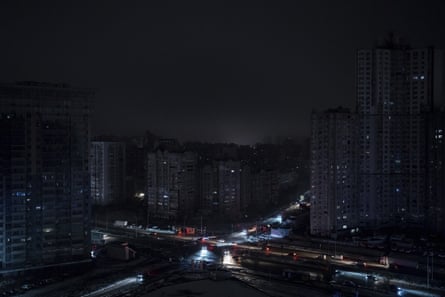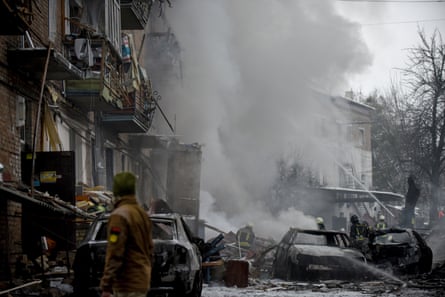Fresh Russian strikes battered Ukraine’s already failing electricity grid, causing blackouts across the country and in neighbouring Moldova, in attacks Ukrainian President Volodymyr Zelenskiy told the UN were “an obvious crime against humanity”.
Addressing an urgent meeting of the UN security council late on Wednesday, Zelenskiy said Ukraine would put forward a resolution condemning “any forms of energy terror”. Referring to Russia’s likely veto, he said, “it’s nonsense that the veto right is secured for the party that wages this war.”
“We cannot be hostage to one international terrorist,” Zelenskiy said.
He also invited the UN to send experts to examine and evaluate Ukraine’s critical infrastructure.
“When we have the temperature below zero, and scores of millions of people without energy supplies, without heating, without water, this is an obvious crime against humanity,” Zelenskiy told the security council via video link.
It comes as talks between the G7 and other pro-Ukraine allies to set a cap on the price of Russian oil reportedly hit a set-back, after a meeting between EU officials ended without agreement.
The price cap on sea-borne exports of Russian oil will form part of sanctions intended to punish Moscow by limiting its revenues from oil exports. EU diplomats were reportedly unable to reach an agreement on what price the cap should be set at.
On Wednesday, Ukraine’s military said Russian forces had fired about 70 cruise missiles at targets across the country and also deployed attack drones.
The strikes killed 10 people and disconnected three nuclear power stations from the grid, officials said.
The country’s Energy Ministry said supplies were cut to “the vast majority of electricity consumers”. All of Kyiv lost water, the capital’s mayor, Vitali Klitschko, said. The city’s administration said water and heating would return to residential buildings on Thursday morning.

Late Wednesday, the deputy head of Ukraine’s presidential office said that Kyiv and over a dozen regions, including Lviv and Odesa in the south, had been reconnected to the power grid.
Klitschko said 21 out of 31 missiles targeting Kyiv were shot down before they reached their targets. One of the 10 that evaded the defences hit an apartment block in Vyshgorod, a northern suburb of the city, killing three people and wounding 15.
There was a kindergarten in the lower ground floor of the building, but it was evacuated after air raid sirens went off. The blast left a three-metre crater in front of the building, destroyed apartments around it, blew the tops of nearby trees and ruined a children’s playground.
“It flew right over us. We heard a whistling sound and then it came down on the building,” said Ruslan Vorona, a local resident. He and his eight-year-old son, Oleksii, were sheltering and charging their phones in a tent set up by the emergency services.
Another local man, Oleksandr, 28, who would not give his last name, said: “There were a few explosions. Two were quieter and one was louder, and one of the missiles went straight over my head.”
Earlier in the day, a newborn baby was killed when a Russian rocket struck a hospital maternity ward in southern Ukraine. Ukraine’s state emergency service said a woman with her two-day-old baby and a doctor were in the facility in the town of Vilniansk, close to the city of Zaporizhzhia, when it was hit. The mother and the doctor were pulled alive from the rubble by rescue workers but the baby died, it said on the Telegram messaging app.
UN political chief Rosemary DiCarlo demanded at the security council meeting that Russia immediately stop the attacks, which violate international humanitarian law, stressing “there must be accountability for any violations of the laws of war.”
US ambassador to the UN Linda Thomas-Greenfield said Vladimir Putin was “weaponising winter to inflict intense suffering on the Ukraine people”.
Russia’s ambassador to the UN, Vassily Nebenzia, told the security council that Moscow was carrying out “strikes against infrastructure in response to the unbridled flow of weapons to Ukraine and the reckless appeals of Kyiv to defeat Russia”.

Ukraine’s foreign minister, Dmytro Kuleba, said the latest series of Russian strikes were a response to a decision by the European parliament to recognise Russia as a “state sponsor of terrorism” over its nine-month invasion of Ukraine, and its call for the 27-nation EU to follow.
“Being unable to win in a fair fight with the Ukrainian army, Russia wages a cowardly war of terror against civilians,” Kuleba said, urging Kyiv’s western backers to supply more air defence systems.
Wednesday’s decision by European legislators to recognise Russia as a “state sponsor of terrorism” is a symbolic political step with no legal consequences.
Kyiv has for months called on the international community to declare Russia a “terrorist state,” and the EU parliament’s decision will probably anger Moscow.
The resolution approved by EU lawmakers said the “deliberate attacks and atrocities carried out by the Russian Federation against the civilian population of Ukraine … and other serious violations of human rights and international humanitarian law amount to acts of terror.”
Ukraine praised the decision, with Zelenskiy calling for Russia to be “held accountable in order to end its longstanding policy of terrorism in Ukraine and across the globe.”
Reuters and Agence France-Presse contributed to this report
